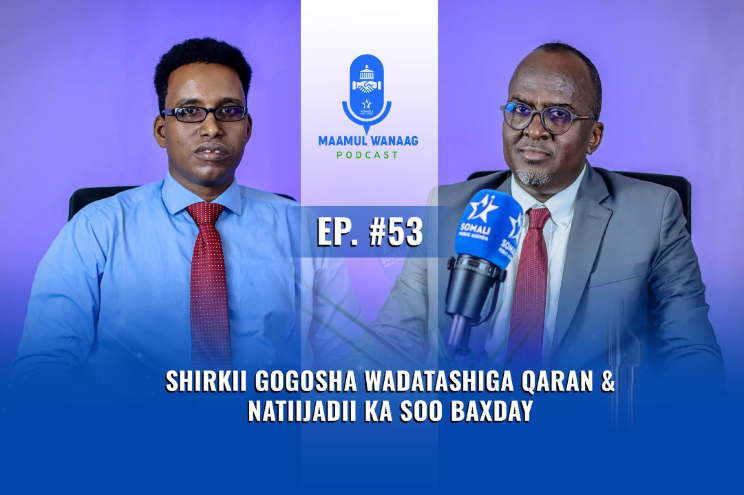Somali Public Agenda
August 25, 2024
Commentary
Somali Public Agenda
August 25, 2024

On Friday, 19 July, the Federal Government of Somalia’s (FGS) Council of Ministers approved a bill to establish the Independent National Electoral and Boundaries Commission. The FGS Ministry of Interior, Federal Affairs and Reconciliation drafted the bill in line with amendments made in March to Chapter Four of the provisional federal constitution, which covers elections. The bill consists of five chapters and 30 articles. It is one of three bills, along with the elections bill and political parties bill, that have now been approved by the cabinet and are essential for implementing direct elections. The bill, together with the two others, is expected to be submitted to the parliament for debate and put to vote.
Key Provisions in the Establishment Bill
Several important articles in the Establishment Bill are essential to review to understand their implications for future election implementation. Article 7 explains the appointment process of members of the Independent National Electoral and Boundaries Commission (INEBC). After consultation with Federal Member States (FMSs), Benadir Regional Administration (BRA), and relevant federal institutions, the FGS Minister of Interior will appoint 18 commissioners from a pool of 54 eligible candidates. Mathematically, this would mean that there will be three candidates for each seat, and the Minister of Interior will select one from each set of three. It is unclear what role FMS leaders will have in the appointment process and the number of candidates they could propose. However, the amendments to Chapter Four of the provisional federal constitution stated that the federal government appoints members of the election management body. This process differed from the NCC May 2023 election agreement, which limited the number of commissioners to 15 and allowed each FMS president and BRA governor to appoint two members and three for the FGS.
Once a final set of appointees is selected, the Minister of Interior will submit the list of 18 proposed commissioners to the FGS Council of Ministers. If the Council of Ministers approves, the cabinet submits the list of commissioners to the parliament for approval. The parliament then votes on whether to approve or reject all 18 commissioners in one batch by a show of hands. A simple majority (50% +1) is sufficient for the Commission members to be approved. The President will then endorse the commissioners through a Presidential Decree. This approval process is markedly different from the procedure the parliament previously used to approve NIEC commissioners, in which parliament voted separately for each commissioner. The specification that the vote should happen via a show of hands also makes the procedure open to manipulation.
Article 8 states the criteria for becoming a member of the Commission, which are more specific than in the previous NIEC establishment act. Article 8 states that members of a political party or anyone who has been a government official in the past six months will be barred from being a commissioner. Similarly, members of the Commission must have resigned for six months before accepting another government position. This provision is designed to block the reoccurrence of past instances where commissioners have moved on quickly to a government position after the conclusion of elections (Article 24).
Article 10 outlines the mandate of the Commission. The article reiterates the responsibilities articulated in Article 56 (Chapter Four) of the amended constitution, namely that it will be responsible for delimiting electoral boundaries and managing all elections in the country – at district, state, and federal levels. This implies the dissolution of the Galmudug Independent Electoral Commission (GIEC) and the Puntland Electoral Commission (PEC), whose mandates would overlap entirely with that of the new Commission.
The Commission would have a nonrenewable tenure of six years, as specified in Article 15. The article also states that the process for selecting new commissioners should begin six months before the six-year term expires. With the exception of the administrative team led by the Permanent Secretary, there will be new commissioners every six years with presumably limited experience in managing elections. The commissioners who gained invaluable experience would certainly not be eligible to contribute and be part of the Commission beyond six years. An alternative approach could have been appointing nine commissioners every three years. This would mean that new commissioners would work with experienced commissioners for three years.
Article 16 specifies that the Commission will have a Permanent Secretary proposed by the chairperson and approved by the commissioners. The Permanent Secretary will lead all operations of the Commission and will not have a time-bound tenure in office.
The Independent National Electoral and Boundaries Commission will have a separate budget allocated in the federal government budget (article 22), and the Commission will be independent in using the budget in line with the Public Finance Management Act. While it is essential that the Commission has a separate budget, technically, its budget could only be included in the annual budget at the end of 2024 as it will be reviewed once every six months. If the Commission is established in the next few months, the government will need to arrange a special budget arrangement for the Commission until the next financial year, which starts in January 2025.
Several other aspects of the bill are worth highlighting. The Chief Justice will swear in the members of the Commission (article 25). The Commission will submit reports to parliament at least once every session (article 26). The Commission can also provide reports to other government institutions in the executive branch. Finally, article 29 states that the National Independent Electoral Commission (NIEC) and the Independent Boundaries & Federalism Commission (BFC) will be dissolved, and the new body will handle the responsibilities of both.
Differences Between the New Commission & the Previous NIEC
The Establishment Bill of the the Independent National Elections and Boundaries Commission has some similarities with the pre-exisitng law, which established the National Independent Electoral Commission (NIEC). These include the six-year term of the Commission, its headquartering in Mogadishu, its separate budget, and a dedicated administrative team.
However, there are two differences. First, the INEBC would handle matters of both election and electoral boundaries. Second, the NIEC was a 9-member commission, whilst the INEBC will have 18 Commissioners.
What Would the Establishment Bill Mean for Somalia?
The bill, as currently specified, has several important implications for the conduct of politics in Somalia. First, in the effective execution of its mandate – managing local council elections, FMS parliamentary and presidential elections, and federal parliamentary and presidential elections – the new Commission will face enormous challenges, including a lack of consensus and acceptance from Puntland and key opposition politicians regarding the establishment of a single national election management body. There are stakeholders who believe that with a federal structure, FMS-level elections should be managed by FMS-level election management bodies.
Second, the endorsement of this bill and the subsequent approval in parliament will lead to a situation where the commission members are selected by the Minister of Interior, approved by the cabinet and parliament, and they elect a chair and a deputy chair among themselves. It will be a move towards the FGS-led electoral roadmap to manage and deliver direct elections across different levels in Somalia.
Third, the Commission, once established, would likely deal with election timelines, including those of the Federal Member States, which the National Consultative Council (NCC) had previously stipulated should take place in November this year. The new Commision will therefore be expected to propose new timlines for the FMS elections, and potentially federal elections, both of which could have very signifcaint political implications.
Challenges
First, although parliament is likely to vote in support of the FGS, there is a chance that opposition MPs might try to oppose or delay the approval of the Establishment Bill. This would further reduce the chances of implementing elections in less than two years.
Second, the process of appointing the 18 members of the Commission and electing a chair could become fraught. The FGS leadership may try to control the process of electing the chair. Federal Member State leaders might also raise issues with the appointment process if their preferred candidates are not included in the list. Puntland would most likely disassociate itself from the entire process.
Finally, as a new institution, the Commission would need time and resources to develop sufficent administrative capacity to be able to credibly lead election implementation. This issue could be somewhat mitigated if civil servants currently employed in the soon-to-be-dissolved NIEC & BFC are transferred to the new Commission. Either way, this will likely delay initial steps toward election implementation, such as voter education, registration of political associaitons and political parties, and voter registration.
The Road Ahead
With less than two years remaining in the four-year term of the FGS and the official expiry of many of the terms of FMS leaders, the Establishment Bill, its endorsement and subsequent appointment of the commissioners is a potentially crucial step towards the FGS-led direct electoral process.
SPA will publish separate analysis on the content of both the National Electoral Bill and the Political Associations & Political Parties Bill in subsequent commentaries.



Somali Public Agenda is a non-profit public policy and administration research organization based in Mogadishu. Its aim is to advance understanding and improvement of public administration and public services in Somalia through evidence-based research and analysis.
Stay updated on governance and public services in Somalia!